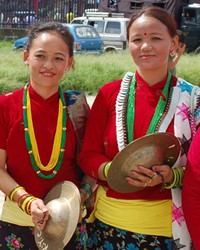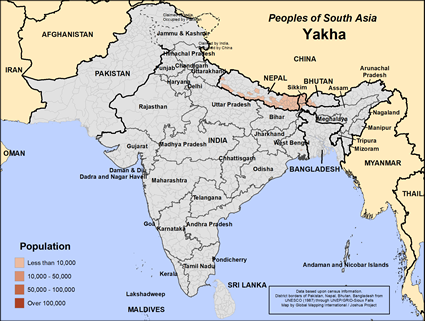The Yakha (or Yakkha) are an indigenous people living in nearly 600 villages throughout the mountains of eastern Nepal. They live throughout the Kosi Zone, primarily south of the city of Chainpur. Of Mongolian descent, they speak Yakkha, a part of the Tibeto-Burman language family.
Nepal is predominantly an agricultural nation. The Yakha subsist primarily as mountain and valley farmers. Men have a tradition of migrating to the cities for work and sending money back to their families.
The primary livelihoods of the Yakha are agriculture and animal husbandry. Most Yakha can own their own land and raise small herds. They grow rice, maize and potatoes. They trade some of their crops for goods that they cannot grow in their homeland. Families work hard together in their farming efforts. Men plow the fields, women plant the seeds, and at harvest time both sexes complete the job. During harvest, families will often help one another with the work, especially during busy times. They typically live in two-storied houses made of timber, mud and stone and covered with thatched roofs. Many Yakha intermarry with members of the Limbu and Rai tribes because their cultures are similar. In most marriages, the boy chooses the girl he wishes to marry. If her parents agree to it, the wedding can take place regardless of what the girl says. Because of intermixing with other Nepalese groups, many Yakha men and women have adapted somewhat to Nepalese culture. Many Yakha are now bilingual, speaking basic Nepali as their second language.
The government of Nepal is opposed to any form of proselytizing, but there are even more problems from family members than from the government.
The Yakha were traditionally animists, worshiping the deities and spirits of nature. Today, however, many identify as Buddhists. A few have embraced Hindu customs and beliefs because of their exposure to Nepalese and Indian culture. The Yakha celebrate and observe all the important Hindu festivals, such as Durga puja and Diwali, the festival of lights. Yakha also engage in ancestor worship (praying to deceased relatives for guidance, blessings and protection). Their priests play an important role. At festival times, they perform marriage and death rites, as well as the puja, or worship ceremonies. There is a tiny number of Yakha who claim to be followers of Christ.
The government of Nepal is opposed to any form of proselytizing. However, most of the time, Christians can follow their religion. There are more problems from family members than from the government. Among the Yakha, they consider Christianity a low-caste or foreign religion. As a result, many Yakha are anti-Christian. Threatened separation from family and tribe is a formidable barrier to most people in the Yakha culture. The Yakha also have a strong desire to hold on to cultural and religious traditions, and Christianity is outside of these.
One key to reaching the Yakha with the gospel, however, may be their desire and deep respect for traits such as honesty and kindness. Believers who have opportunities to live Christ-filled lives before the Yakha may gain their respect and point them to the Lord Jesus. The Yakha would benefit from access to modern medicine and solar panels.
Ask the Lord of the harvest to send forth laborers to the Yakha people of Nepal. Pray that God will open the hearts of Nepal's governmental leaders to Christ's ambassadors. Ask the Lord to bring forth a strong, Bible-based church planting movement among the Yakha people of Nepal.
Pray for entire Yakha families to embrace Jesus Christ.
Scripture Prayers for the Yakkha in Nepal.
| Profile Source: Joshua Project |












